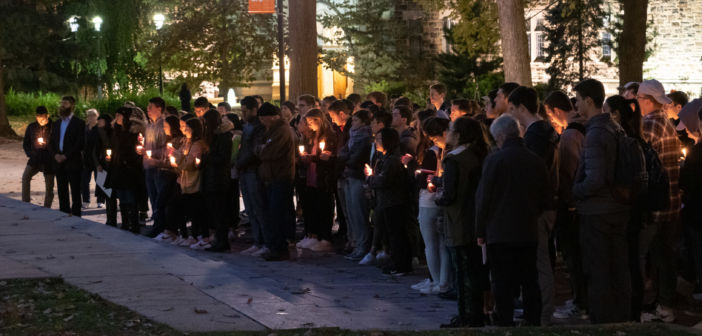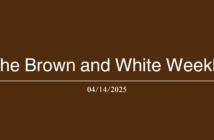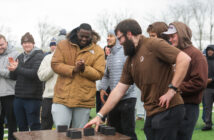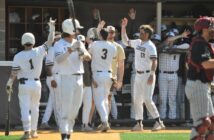Under the shadows of the UC flagpole, against the backdrop of a clear evening sky, Lehigh members wiped away quiet tears, put arms around their peers and stood in relative silence for one hour at 6 p.m. on Monday.
Lehigh faith leaders, students, faculty and staff illuminated the night sky with vigil candles to remember the 11 Jewish adults who lost their lives in a mass shooting at the Tree of Life synagogue in Pittsburgh on Saturday. The act is being treated as an anti-Semitic hate crime by federal investigators.
The event on campus brought leaders from Lehigh’s Jewish, Christian and Muslim communities together in a mostly silent vigil, with the exception of words offering comfort and preaching love from Rabbi Steve Nathan, the director of Jewish Student Life, Lloyd Steffen, the university chaplain and Walead Mosaad, the director of Muslim Student Life.
“This is about healing, about remembering those who were murdered on Shabbat,” Nathan said. “It’s just unbelievable that it happened — and yet not unbelievable at all. When we come together as a community, it reminds us how much is possible.”
Nathan said the vigil included support from many facets of student life, including the Office of Multicultural Affairs and the Pride Center. He said the three main Jewish groups on campus — Chabad, Hillel and Lehigh’s chapter of Alpha Epsilon Pi — also united as one voice to condemn hatred and violence.
Those who attended the vigil walked in silence with candles in hand from the flagpole, up to Johnson Hall, down Taylor Street by Lamberton Hall and ultimately made their way back to the front lawn.
Remarks from all three campus religious leaders followed. The event concluded with a song of harmony and compassion by Glee Club, an all-male university choir group.
For one student, the tragedy in Pittsburgh hit close to home.
“I lived in Pittsburgh and went to that (synagogue),” said Julia Gross, ’18G. “This seemed like a way, in Bethlehem, to be a part of that community.”
Others had different reasons for their grief.
“My really good friend is Jewish — he was struck by this, and I wanted to support him,” said Seth Slavin, ‘21. “This murder was traumatic in all ways, no matter your race, religion or gender.”
Mosaad spoke bluntly about his feelings on the attack, urging young people in the audience to choose tolerance over bigotry and civility over violence.
“To be honest, I’m angry more than anything else,” Mosaad said. “How long are we going to stand here, then disperse, then come right back here once again? Enough is enough.”
Students, many visibly upset, listened to speakers who lamented that the pattern of incivility, intolerance and hatred of minority groups has been allowed to fester and eventually, spew out as violence. Mosaad specifically reminded the audience that no one group — not Blacks, not Jews, not Muslims — pose an “existential threat” to any other one group.
Steffen focused on looking toward the future and improving ourselves.
“These are sad days, yes,” Steffen said. “But it’s also a time to recommit ourselves to our values.”
Nathan, choking up, read the names of each of the 11 individuals who lost their lives in worship, in the middle of the close-knit Squirrel Hill neighborhood.
After his remarks that seemed to question why humans are in this world if they only seek to destroy and hate, Nathan turned, returning to his faith as a source of hope.
“If each of us saves one life, it is as if we save a world,” Nathan said. “People are put here to make the world a better place.”






Comment policy
Comments posted to The Brown and White website are reviewed by a moderator before being approved. Incendiary speech or harassing language, including comments targeted at individuals, may be deemed unacceptable and not published. Spam and other soliciting will also be declined.
The Brown and White also reserves the right to not publish entirely anonymous comments.
1 Comment
“Mosaad spoke bluntly about his feelings on the attack, urging young people in the audience to choose tolerance over bigotry and civility over violence.
“To be honest, I’m angry more than anything else,” Mosaad said. “How long are we going to stand here, then disperse, then come right back here once again? Enough is enough.””
Two statements that don’t quite align unless you consider the first phrase of the first sentence as describing the second sentence while indicating emotion; the second phrase describes the action emanating from the emotion; an action I would suggest should be the response in non life or death situations.
I’m surprised that there is no mention of prayer in the reporting. Is that an omission or accurate reporting? Prayer is my first thought when evil appears as in Pittsburgh